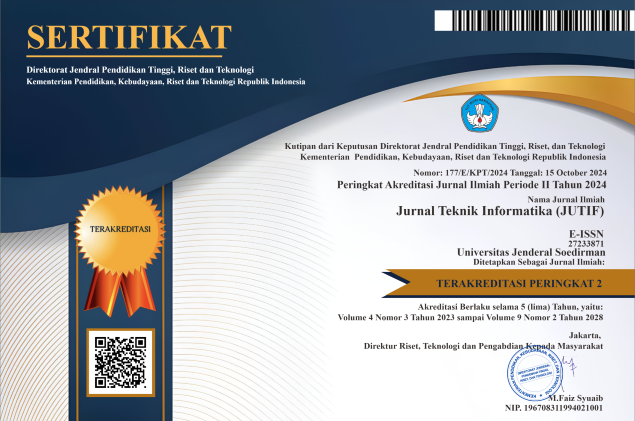IMPLEMENTATION OF SPRINT LIFE CYCLE FROM AGILE METHODOLOGY WITH KNOWLEDGE MANAGEMENT CYCLE
DOI:
https://doi.org/10.20884/1.jutif.2022.3.5.288Keywords:
Agile, Cycle, Knowledge Management, Knowledge Management Cycle, Scrum, SprintAbstract
Companies in almost every industry are adopting Agile techniques to improve IT projects, manage marketing initiatives, and manage their businesses. With the sprint life cycle implemented in the company, knowledge management can always be updated. The research was conducted by collecting literature studies, conducting literature review analysis and proposing a theory of the results of the study analysis. Through this research, it is known that by implementing the sprint life cycle of Google Ventures in the Knowledge Management process that adopts the analysis of the framework initiated by Evans (2014), Wee and Chua (2013) , Akhavan (2009), Lettieri (2004), Chyi Lee (2000) can produce a basic theory regarding the application of the sprint life cycle in knowledge management, namely: (1) Identify, Create, and Understand, (2) Sketch and Innovation, (3) Decide and Organize, (4) Prototype and Codification , (5) Test, Use, Share, and Learn. With the ideas from the results of this study, it is possible to expand the previous KMC model by integrating the sprint framework pattern by linking several initiatives within the existing KMC. Produce KMC Sprints that have advantages based on the nature of the Agile methodology, namely speeding up change/knowledge creation time and adaptability.
Downloads
References
H. Bundtzen and G. Hinrichs, “The Link Between Organizational Agility And VUCA – An Agile Assessment Model,” SocioEconomic Challenges, vol. 5, no. 1, pp. 35–43, 2021, doi: 10.21272/sec.5(1).35-43.2021.
S. N. Faradila, “LIPI: 39,4% Bisnis di Indonesia Gulung Tikar Akibat Pandemi Corona,” Kumparan Sains, May 19, 2020.
R. Rahardian, A. A. Rizky, M. A. N. Nugraha, F. Dharma Adhinata, and A. Utami, “Agile Software Development on Design and Layout of Booking Room Website (Case Study: Witel Telkom Yogyakarta),” Jurnal Teknik Informatika (JUTIF), vol. 3, no. 1, pp. 61–67, 2022, doi: 10.20884/1.jutif.2022.3.1.132.
J. A. Fridayani, “Kepemimpinan Adaptif Dalam Agilitas Organisasi di Era Adaptasi Kebiasaan Baru,” Modus, vol. 33, no. 2, pp. 138–149, Jul. 2021, doi: 10.24002/modus.v33i2.4654.
S. H. Nova, A. P. Widodo, and B. Warsito, “Analisis Metode Agile pada Pengembangan Sistem Informasi Berbasis Website: Systematic Literature Review,” Techno.Com, vol. 21, no. 1, pp. 139–148, Feb. 2022, doi: 10.33633/tc.v21i1.5659.
Jake Knapp, John Zeratsky, and Braden Kowitz, Sprint: How to Solve Big Problems and Test New Ideas in Just Five Days. 2018.
A. Indri, N. Marpaung, and Nurwati, “Analysis Of Supply Chain Management Methods In Raw Material Inventory And Distribution Of Crips In Ud. Bu Sri Web-Based,” Jurnal Teknik Informatika (JUTIF), vol. 3, no. 2, pp. 331–339, 2022, doi: 10.20884/1.jutif.2022.3.2.225.
H. Restu, H. R. Marwan Indra Saputra, Aris Triyono, and Suwaji, Metode Penelitian. Sleman: Deepublish, 2021.
Helaluddin and Hengki Wijaya, Analisis Data Kualitatif: Sebuah Tinjauan Teori & Praktik. Sekolah Tinggi Theologia Jaffray, 2019.
N. Hikmah, A. Suradika, and R. A. Ahmad Gunadi, “Metode Agile Untuk Meningkatkan Kreativitas Guru Melalui Berbagi Pengetahuan (Knowledge Sharing) (Studi Kasus: Sdn Cipulir 03 Kebayoran Lama, Jakarta),” Instruksional, vol. 3, no. 1, p. 30, Oct. 2021, doi: 10.24853/instruksional.3.1.30-39.
K. Anwar, L. D. Kurniawan, M. I. Rahman, and N. Ani, “Aplikasi Marketplace Penyewaan Lapangan Olahraga Dari Berbagai Cabang Dengan Metode Agile Development,” Jurnal Sisfokom (Sistem Informasi dan Komputer), vol. 9, no. 2, pp. 264–274, Aug. 2020, doi: 10.32736/sisfokom.v9i2.905.
E. S. Hidalgo, “Adapting the scrum framework for agile project management in science: case study of a distributed research initiative,” Heliyon, vol. 5, no. 3, p. e01447, Mar. 2019, doi: 10.1016/j.heliyon.2019.e01447.
H. Lei, F. Ganjeizadeh, P. K. Jayachandran, and P. Ozcan, “A statistical analysis of the effects of Scrum and Kanban on software development projects,” Robot Comput Integr Manuf, vol. 43, pp. 59–67, Feb. 2017, doi: 10.1016/j.rcim.2015.12.001.
Ikujirō Nonaka and Hirotaka Takeuchi, The Knowledge-creating Company: How Japanese Companies Create the Dynamics of Innovation. 1995.
V. Poliakova, “Using Google Ventures Design Sprint Framework for Software Product Development in Startups,” 2017.
A. Hasbi, “Pengaruh Knowledge Management terhadap Pengembangan Sumber Daya Manusia dan Kinerja Karyawan Perhotelan di Sulawesi Selatan,” Jurnal Kawistara, vol. 10, no. 2, p. 199, Nov. 2020, doi: 10.22146/kawistara.56756.
Hani Darmawati, “Pengaruh Knowledge Management dan Talent Management terhadap Pengembangan Karir Karyawan,” Jurnal Riset Manajemen dan Bisnis, vol. 1, no. 1, pp. 36–41, Jul. 2021, doi: 10.29313/jrmb.v1i1.38.
P. Sitasi: Kurniawati, A. P. Soesanto, R. P. Samadhi, T. A. Wiratmadja, and I. I. Sunaryo, “Perkembangan Model Knowledge Management Cycle: Sebuah Tinjauan Pustaka,” 2017.
M. Max Evans, Kimiz Dalkir, and Catalin Bidian, A Holistic View of the Knowledge Life Cycle: the Knowledge Management Cycle (KMC) Model, vol. 12. EJKM, 2014.
N. Jayashri and K. Kalaiselvi, “Knowledge Acquisition-Scholarly Foundations with Knowledge Management,” International Journal of Advanced Studies of Scientific Research, vol. Vol. 3, no. No. 12, pp. 334–339, 2018, [Online]. Available: https://ssrn.com/abstract=3326689
D. I. Castaneda and S. Cuellar, “Knowledge sharing and innovation: A systematic review,” Knowledge and Process Management, vol. 27, no. 3, pp. 159–173, Jul. 2020, doi: 10.1002/kpm.1637.
D. N. Joudrey, A. G. Taylor, and K. M. Wisser, The Organization of Information, 4th ed. Santa Barbara, California: Libraries Unlimited, an imprint of ABC-CLIO, LLC, 2018.
W. Ritzel Paixão-Côrtes, V. Stangherlin Machado Paixão-Côrtes, C. Ellwanger, and O. Norberto de Souza, “Development and Usability Evaluation of a Prototype Conversational Interface for Biological Information Retrieval via Bioinformatics,” 2019, pp. 575–593. doi: 10.1007/978-3-030-22660-2_43.
E. Lettieri, F. Borga, and A. Savoldelli, “Knowledge Management in Non‐profit Organizations,” Journal of Knowledge Management, vol. 8, no. 6, pp. 16–30, Dec. 2004, doi: 10.1108/13673270410567602.
J. H. Heinrichs and J. S. Lim, Encyclopedia of Information Systems. California State University, Bakersfield, California: Academic Press, 2002.
M. Evan and N. Ali, “Bridging Knowledge Management Life Cycle Theory and Practice,” in International Conference on Intellectual Capital, Knowledge Management and Organisational Learning, A. Green, Ed. Washington, DC, USA: The George Washington University, 2013, pp. 156–165.



























